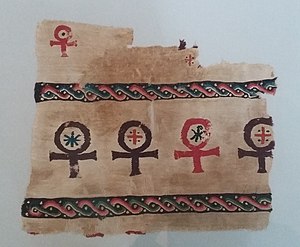Qubdi
Republic of Qubdi δημοκρατία της γυπτος (Aroman) جمهورية قبط (Sahrabic) | |
|---|---|
Flag
| |
| Capital | Taqdir |
| Official languages | Occidental Aroman |
| Recognised regional languages | Sahrabic |
| Demonym(s) | Qubdian |
| Government | Republic |
• President | Rami Yacoub Ghali |
| Population | |
• 2016 estimate | 25,010,000 |
| Currency | Qubdian Nomisma (NQu) |
This article is incomplete because it is pending further input from participants, or it is a work-in-progress by one author. Please comment on this article's talk page to share your input, comments and questions. Note: To contribute to this article, you may need to seek help from the author(s) of this page. |
(1st sentence: short name, long name, location. 2nd: government, rules from capital city. 3rd: special partner nations and general interactions with Eurth)
Etymology
(Where does the name come from? How is it pronounced? What is the name in local language?)
The Aroman name for Qubdi, Kýptos (Γυπτος), comes from the Classical Adapton Occidental Aroman name ku-pi-ti-jo. This Adapton form is likely from Middle Qubdian kꜣ ptḥ, meaning "the kꜣ of Ptah". The god Ptah was worshipped at a temple complex near Taqdir.
The Anglish name Qubdi is also derived from the Classical Aroman "ku-pi-ti-yo". Compare this to the Hakkadian "ku-up-ta-aḫ". In Sahrabic it is known as "qubṭī" or "قبط" ("qubṭ").
Geography
(Location on Eurth. Neighbouring nations. Where do most people live? Cities: capital Taqdir, 2nd city Itjtawy, port Naucratis. Which seas area around? How long is the coastline? Highest and lowest points. What's the climate like? Any special natural places? What kind of animals are there?)
History
(First mentions. Early history. Ruled by a Heqa. Migrations from Azania into Amutia. Contacts with Aroman Empire. Relations with Bashan. Post-Aroman period. Brotherhood of the Cruciform Sword established in the 10th Century.[1] Early modern issues. Modernisation. Revolutions. Republic.)
Politics
(How kind of government? Who is the head of state/government? When was the last election or change of government? Which political parties are there? How are the foreign relations? What is the military like?)
Economy
(Energy. Transport. Media.)
Demographics

(Ethnic groups: Copts. Language: Coptic language and Coptic alphabet. Religion: Coptic, mixed with local worshop and Salamic influences. Health. Education)
Culture
(Literature. Visual arts. Music. Cuisine. Sport.)

